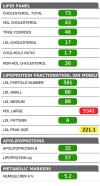Throwing out the high risk patients as i can see they are special and may need more aggressive treatment then most. Hence the reason i wrote amount average people on stains. The 1 other study did seem to show some promise, although it seemed those on the stating still died but only 70% as much as the control group.
An excellent point. To be clear, I'm not suggesting that everyone get on statins. I am suggesting that it's an effective intervention for ASCVD. Total cholesterol is not causal of arterial plaque burden, nor even closely correlated. LDL-C is not causal of arterial plaque burden, but is closely correlated. ApoB is directly causal of arterial plaque burden and happens to be traffic into the arterial walls by LDL. Even those ApoB is causal, it is considered necessary but not sufficient for the progression of ASCVD. It is possible to have high ApoB and yet still not suffer the progression of ASCVD. It is possible for people to have very high calcium scores and yet never have a MACE. One of the difficulties in this area is in interpreting the probabilities.
Being a smart person i am sure you open mindedly looked at both sides of the issue.
In as much as I can. I have an obvious bias. On the topic of statins, I've challenged that bias and attempted to find real data that supports the incidence of adverse side effects that people report. I've come up short.
I can deconstruct the studies you mentioned:
Total cholesterol and all-cause mortality by sex and age:
This is a large observational study that fails to show a linear relationship between total cholesterol and increased all cause mortality. I am not surprised, given what I wrote earlier. In many of these observational studies it's difficult to tease out a benefit in all cause mortality when deaths from ASCVD would represent a fraction of those. One could speculate about the reasons the u-shaped curve of all cause mortality vs. total cholesterol. In fact, we'd have to, because the paper doesn't really offer much.
Low Cholesterol is Associated With Mortality From Stroke, Heart Disease, and Cancer:
Again, this is another observational study in which people with low LDL that were *not* receiving any kind of lipid lowering medication had increased mortality. The lower LDL is correlated, but isn't causal. There could be any number of reasons why this may be the case.
Cholesterol and all-cause mortality in elderly people from the Honolulu Heart Program: a cohort study:
This is yet another observational study showing a correlation, but establishing no causal relationship.
In totality it suggests that across the entire population total cholesterol is not a good marker for deaths from all cause mortality, which I would readily accept. To some degree it refutes guidance from the medical community that "cholesterol is bad" and is an unfortunate failing on the part of the medical community to educate the general public.
None of that changes the fact that there are hosts of randomized clinical trials showing statins reducing the risk of death from ASCVD among patients at risk.
I know I am at risk. My aunt had an MI in her 40s. I had a CT-CAC a few years back and got a non-zero score, 48 I believe all of it in the LAD aka the "widow maker". My lipids weren't especially bad, but I'm running a multi-year experiment with N=1. My aim was to get ApoB below 60mg/dL as there's some literature that suggests that doing so may reverse calcified plaque. In full disclosure, it is promising, but not conclusive.
I began the process with all the non-pharmaceutical interventions. Diet, exercise, psyllium husk, fish oil, whatever. The needle moved a little. I tried ezetimibe mono-therapy. The needle moved a little. I was avoiding statins because they're a bugaboo. I had lunch with a friend of mine whom I hadn't seen in years. We were talking about such things. He was the prototypical American, obese, sedentary, poor health, shitty diet. Yet his lipids were significantly better than man on 20mg rosuvastatin. So, I decided to give it a whirl.
I started with a low dose, monitored for sides, experienced none, and continued. Eventually I added bempedoic acid and Repatha for the aforementioned reason in that I hope to reverse the calcified plaque, but also to create some headroom for my lipids to get worse as I increase my gear usage. Presently, they look like this:

As a result, I feel pretty good about the fact that I'm at 1.5g/wk and climbing.
In the end big pharma has decades of data from their patients yet they do no publish things about life expectancy for some reason.
You won't find simple to parse "life expectancy" data available for interventions for any other disease either. It's tremendously hard to do that math and even harder for the lay person to understand.






